Domestic abuse shelters are going to the dogs and saving more lives
February 12, 2023
By Mark LaFlamme for the Sun Journal — A few years ago, when construction was nearing completion on one of the Safe Voices domestic abuse shelters, a woman came in seeking refuge from a violent relationship.
She had come in a hurry and didn’t have much with her. All that was familiar and comfortable to her had been left behind, including her beloved dog.
It didn’t go well at first.
“She had been there two weeks and hadn’t come out of her room,” says Elise Johansen, executive director of Safe Voices. “She hadn’t showered, she hadn’t really been able to function and start moving on.”
Safe Voices by that point knew how important pets are to those fleeing difficult situations. The plan was to make this shelter pet friendly, but they were not quite there yet, and this woman was suffering.
“When she first came in, we were in the middle of our remodel so the pets were not in yet,” recalls Noelle Coyne, Safe Voices director of shelter and housing services. “She was there a couple weeks without her pet. She wasn’t engaging in the house. She wasn’t getting out of bed. She wasn’t working on anything and she was really just very lonely.”
One can imagine the woman’s inner turmoil. The stats on these kinds of situations are bleak: A full 70 percent of the survivors of domestic abuse report that their abusers threatened, abused or killed family pets in an effort to exert control.
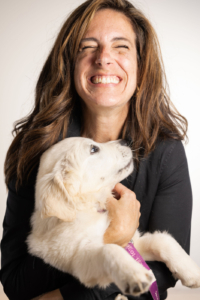
Elise Johansen, Safe Voices executive director, plays with therapy-dog-in-training Oliver in this photo from last year supplied by Save Voices. “We have had people who have had to leave our shelter because the abuser said ‘If you don’t come back, I will hurt and harm your pet’ or ‘I’m not going to feed them,’” said Johansen. Submitted photo
“When a survivor leaves an abusive relationship, oftentimes the abuser escalates,” says Grace Kendall, director of development and engagement at Safe Voices, “and they can escalate dramatically. It’s the most dangerous time of all when the survivor is leaving. And so if the abuser doesn’t know where the survivor is, but they do have access to the pet, the chance of that pet being the target of escalation is really high. And that’s hard for a survivor to sit with, not knowing what’s happening.”
The people of Safe Voices understand this problem very well. They have seen the impact that pets make on a survivor’s mental well-being time and time again.
“We have had people who have had to leave our shelter because the abuser said, ‘If you don’t come back, I will hurt and harm your pet’ or ‘I’m not going to feed them,’” says Johansen. “Abusers are going to use everything and anything in front of them, and animals and pets are no different.”
Yet, all was not hopeless for the sad and lonesome woman who missed her dog.
LIKE FLICKING A SWITCH
Safe Voices, which has been serving survivors of abuse and sex trafficking in Androscoggin, Franklin, and Oxford counties since 1977, had already partnered with Red Rover and Rescue Rebuild to begin equipping each of its emergency shelters to welcome survivors and their pets. The day came when that distraught survivor was able to bring her dog into the shelter with her at last, and her response was immediate.
“As soon as the build was done and the dog came in, she turned it around completely,” says Johansen. “She started engaging in the shelter, cooking meals for everybody. Having that pet there for her, it changed her personality completely.”
“It was literally like flicking a switch,” says Coyne.
Getting her dog back was a life-changing affair, as it turns out. For two-and-a-half years now, the woman has been in stable housing and living a new and healthy life.
“She reconnected with her family with whom she had lost touch,” Coyne says. “She’s created a budget and all that. She’s living her best life. Everything changed for her when her dog came in.”
The difference a pet can make in abuse sufferers’ survival cannot be overstated, the experts said. Roughly 50 percent of domestic abuse survivors say they delayed their efforts to flee because they were worried about the pets they would leave behind. And yet currently, only 15% to 18% of domestic abuse shelters nationwide allow pets. It used to be 3%, so the trend may be catching on.
Safe Voices is ahead of the curve — its Androscoggin County shelter became the first pet-friendly domestic abuse shelter in the state of Maine in 2019. It now has two domestic abuse shelters — in Androscoggin and Franklin counties — that are pet-friendly, as well as a pet-friendly safe house for survivors of sex trafficking and sexual exploitation.
RedRover, the group Safe Voice turned to for guidance, works nationally toward a goal of increasing the number of pet-friendly domestic violence shelters in the U.S. from 15% to 25% by 2025. The hope is that before long, all shelters of this type will accommodate pets.
From what the folks at Safe Voices has seen, the benefits of having animals around is all encompassing. It’s not just the victims of abuse who thrive with their pets at hand, it’s their children, as well. It’s the other shelter occupants and the staff, too.
“It makes a world of difference for the person that pet is coming with,” Coyne said, on a recent episode of pet podcast, ‘Oh, Behave, “but also for the entire house, because a pet really does make it feel like a home.”
Safe Voices, seeing all these benefits playing out, has gone all in on pets. In addition to pet-friendly policies for survivors at their shelters, the nonprofit has become a pet-friendly employer, with many staff bringing their pets into work. And Safe Voices, working with Mission Working Dogs, a service started by a Maine woman, even added two therapy dogs to the organization in 2022.
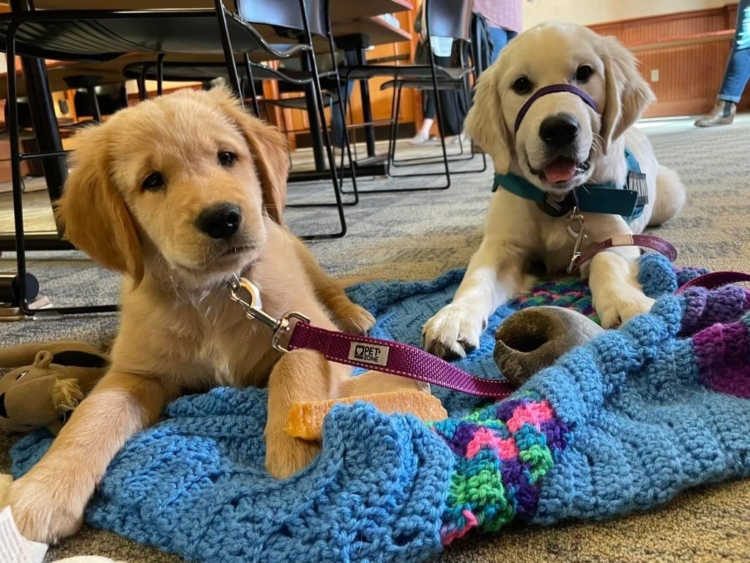
Therapy-dogs-in-training Jefferson, left, and Oliver take a quick break during a Safe Voices staff meeting in October 2022. Submitted photo
The first, a golden retriever named Ollie, joined Safe Voices in the summer of 2022 and began his therapy certification training in the fall alongside his owner/handler, Katrina White, who is Safe Voices’ sex trafficking and sexual exploitation outreach coordinator.
“He’s wonderful,” Johansen says of Ollie. “He’s beautiful and amazing. He has already made a profound impact on survivors and staff.”
Ollie is for sure a part of the Safe Voices team. Pop into their Lisbon Street administrative offices in Lewiston and Ollie, curious and exuberant, will greet you at the door. When the Safe Voices team goes out for public events, Ollie goes out with them and becomes at once a crowd favorite.
Ollie, like most pets, are mood lifters.
“We started seeing the difference it made for the survivors; not only the ones who have their own pets, but the ones who got to benefit from somebody else having a pet,” says Coyne, during a recent conversation at the office.
She turns to Ollie, who is happily accepting scratches behind the ear from everyone in the room.
“Look at the energy he brings to a room,” Coyne says. “He makes you just feel happy and silly and at peace. And it was having that impact on everybody in the house, including the staff, who do really hard work every single day. It was having an impact on everybody in the house.”
HORSES AND COWS WELCOME
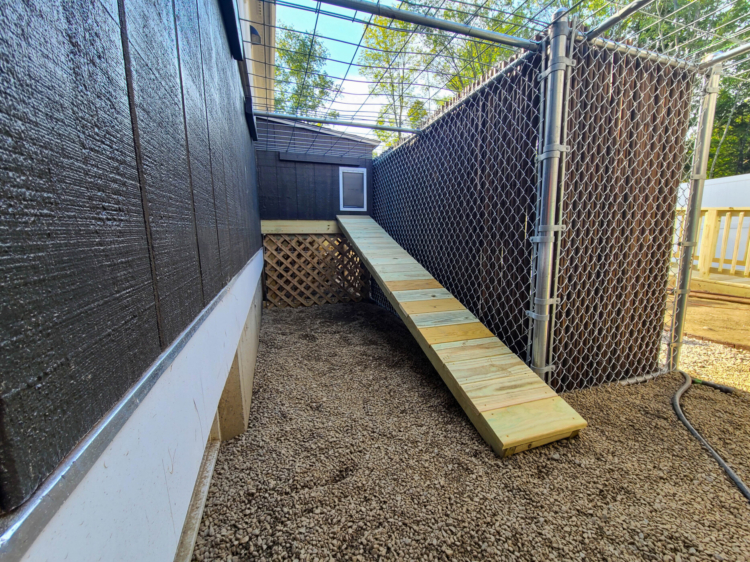
This pet door and ramp at a Safe Voices shelter lead directly from a shelter bedroom to an enclosed kennel, so a survivor’s pet can have free access to the outdoors Submitted photo
Transforming a shelter into a space that will hold up to a fleet of dogs and cats didn’t turn out to be as expensive as they’d expected, either. Crews installed hard rubber floors that are meant to be resilient against the paws and claws of dogs, cats and other critters. They added other features to accommodate the legendary curiosity of cats and other animals
“If your animals are bored, they’re going to become disruptive,” Johansen says. “So there are these cat bridges, there are hammocks and there’s these little squares so the cats can climb around the wall.”
They also provide outdoor space for dogs to run, and indoors there are areas where a dog can stay temporarily.
“So if a survivor needs to go to the supermarket for a couple hours or go back to work, and since leaving their dog or cat in their room isn’t probably the best idea, we have some kennel space in there,” Johansen says.
It’s a tidy system and so far, it has been working out well. It’s hard to say how many lives have been changed since pets have been allowed at the shelters, but Safe Voices staff members have no doubt that it WILL change lives, and for the better. For those who need to flee abusive relationship, the fact that pets can’t flee as well might spell the difference between seeking help and staying put.
“This person needs to uproot their entire life in order to be safe,” Johansen says. “They have to leave everything behind. You come into the shelter A: through no fault of your own; B: with barely anything, and C: for people who love their pet, they had to come in without that pet, and so in a lot of ways, it feels like you’ve left with nothing.”
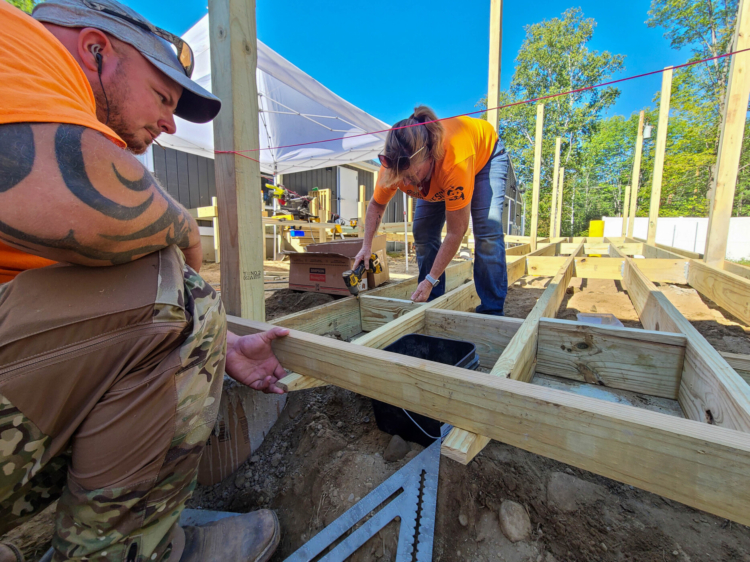
Staff with Rescue Rebuild work on a deck and ramp as part of a pet-friendly remodel of the Safe Voices shelter in Farmington. Submitted photo
Safe Voices has made it a somewhat easy affair for a person to bring in a cat, dog or other small animal as they flee a bad environment. But what about those who have become attached to larger animals? What about the burlier beasts that occupy space in a survivor’s heart?
“Some people who come to us have animals that are not domesticated animals,” Johansen says. “They might have a horse, or goats, or chickens and cows, and they can’t leave them on the property with the abuser.”
Safe Voices is all over that, too. Specifically, they established a relationship with the Greater Androscoggin Humane Society — which is already helping the shelters with pet vaccinations and the like — which in turn has relationships with a whole bunch of foster families, some of whom may have the space to house a bigger animal on a temporary basis.
Safe Voices is also working to connect with people with farms or who otherwise have the space to take in extra animals while their owners get the help they need.
It’s a work in progress, all of it, but the result of bringing pets into the shelters has already proven to be a winning strategy. Having critters has been uplifting for the pet owners and other shelter occupants and it helps when the children of survivors enter the mix — some kids who won’t talk about things at all suddenly open right up once there’s a dog in the room to play with or a cat to menace.
You can understand why the folks of Safe Voices hope to see more pet-friendly shelters opening up as time goes by. The power of pets is a real thing; when it comes to people whose lives are in complete disarray, that beloved dog, cat or other pet might be the only hope they have that they one day might be happy, safe and cherished again.
“Pets remind you that you’re worthy of love,” says Johansen. “And they do that every day.”
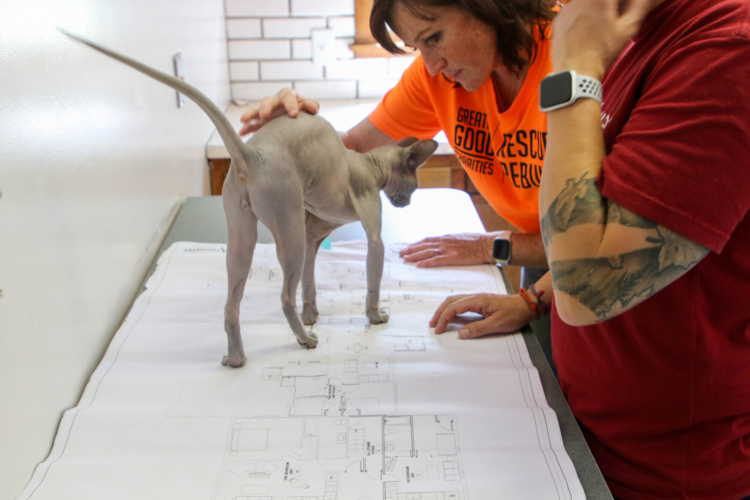
A staff member’s cat walks over blueprints for the pet-friendly remodel of Safe Voices’ Farmington shelter. Submitted photo
